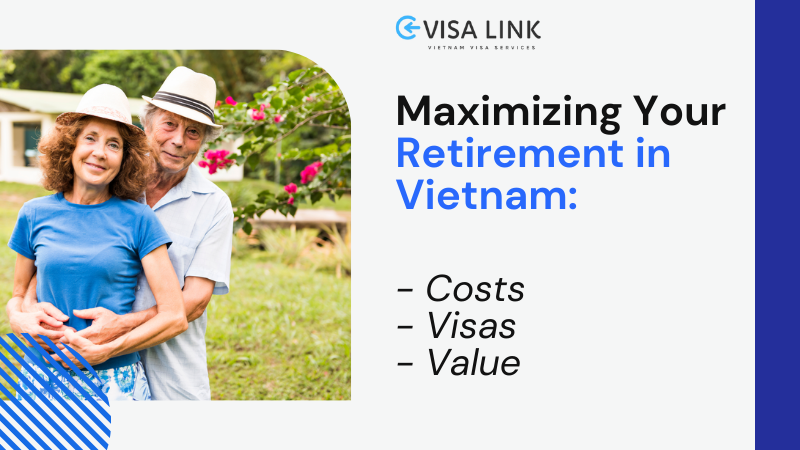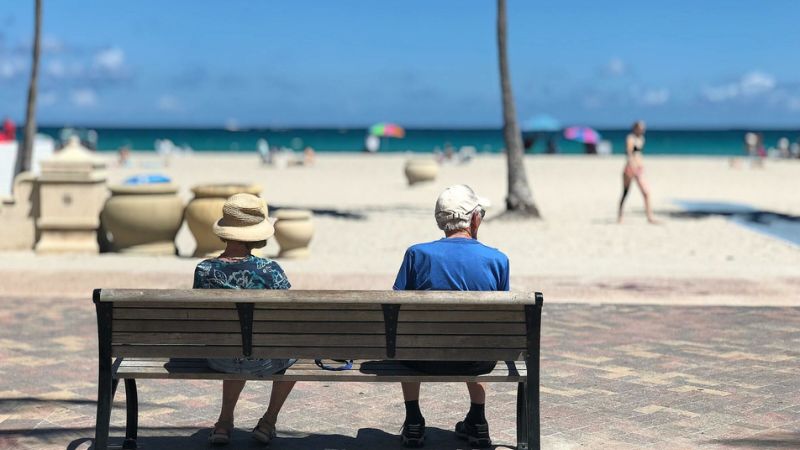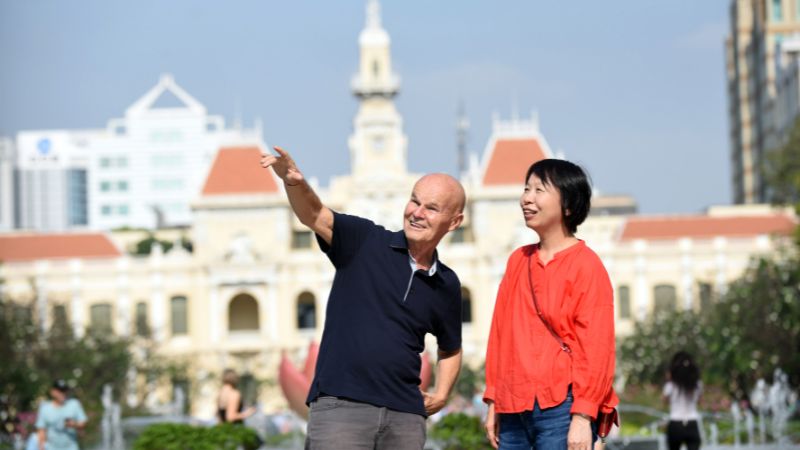Retirement is a big step in life, and for those in search of something special, Vietnam shines as an incredible choice. Boasting a rich culture, stunning scenery, and remarkably affordable living, Vietnam is a retiree’s dream destination. In this guide, we’ll explore retiring in Vietnam and check out the “Retire in Vietnam visa” options available.
Visa for retirement in Vietnam
As of now, Vietnam does not offer a dedicated retirement visa. Retirees are typically granted tourist visas, which may require extensions or visa runs. If you have Vietnamese family ties, you may be eligible for a longer-term visa exemption. It’s essential to stay updated with visa policies, as they can change over time.
Recent changes in Vietnam’s Immigration Law mean retired foreigners can retire in Vietnam with a business or investor visa.
The investor visa (DT Visa)
This visa category is attracting growing interest among financially independent foreigners looking to retire in Vietnam. It’s tailored for individuals with the financial means to invest in the country. The DT Visa has several subtypes based on the amount of capital you plan to invest:
- DT1: For investors contributing at least VND100 billion or those investing in businesses with incentives.
- DT2: For investors with VND50-100 billion capital or those investing in encouraged businesses.
- DT3: Designed for investors willing to invest between VND3 billion and less than VND50 billion.
- DT4: Tailored for foreigners with capital contributions less than VND3 billion.
The duration of the investor visa varies based on the subtype. Typically, DT1 and DT2 visas are issued for five years, DT3 for up to three years, and DT4 for one year.
The business visa (DN Visa)
The Business Visa, also known as the DN Visa, is suitable for short-term stays. It’s designed for foreigners coming to Vietnam for business purposes without a work permit. The DN Visa is available for 1 month, 3 months, 6 months, or a maximum of 12 months (one year). To extend your working period, a work permit is required.
Meeting the visa requirements is crucial before applying for a business visa. You can do so through an Embassy/Consulate or on arrival in Vietnam.
Qualifications for retiring in Vietnam
To retire in Vietnam, you must meet specific criteria:
- You must be officially retired in your home country.
- Valid health insurance is essential.
- You should be financially independent, capable of supporting yourself and your family during your stay in Vietnam.
- You must have no criminal charges or serious convictions on your record.
Retiring in Vietnam is a bit different, but it combines culture, beauty, and affordability. Understanding the available visa options and eligibility requirements is crucial for a successful retirement experience in this vibrant and diverse country.
Why consider retiring in Vietnam?
If you’re not sure about retiring in Vietnam, here are some strong reasons why it’s a great choice:
Affordable real estate
Property prices in Vietnam are remarkably reasonable, especially when compared to places like China or Bangkok. Vietnam is emerging as a property hotspot in Asia. In the city center, apartments can cost between $1,712 and $6,420 per square meter, but outside the city center, you can find apartments for as little as $645 per square meter
Safety and security
Vietnam is ranked 57th in global safety rankings and boasts a low crime rate. Violent crime is exceptionally rare, ensuring a secure environment for its residents. This peace of mind is a significant factor for retirees seeking a worry-free life.
Quality healthcare
Vietnam provides high-quality healthcare services, including affordable dental care, to all legal residents. Although healthcare is not free, treatment costs are still relatively low and accessible to everyone.
Welcoming locals
Vietnamese people value qualities like humility and modesty. They are known for their warm hospitality and respect for others. Living among such welcoming neighbors ensures a great experience during your retirement in Vietnam.
What it takes to retire in Vietnam
A previous ranking by International Living suggested that most foreigners could live comfortably in Vietnam on a budget ranging from $800 to $1,200 per month. With $200,000 in savings, your retirement funds could last approximately 21 years. The cost of living mainly includes rent, meals, groceries, leisure activities, and mobile phone bills.
Here’s an overview of the typical expenses in Vietnam:
| RENTING | Monthly Cost |
| Apartment (1 bedroom) in City Center | $375 |
| Apartment (1 bedroom) Outside of Center | $240 |
| Apartment (3 bedrooms) in City Center | $885 |
| Apartment (3 bedrooms) Outside of Center | $475 |
| ACCOMMODATION | PRICE/ m2 |
| Price for purchasing an apartment in City Centre | $2815 |
| Price for purchasing an apartment Outside of Centre | $1400 |
| FOOD | COSTS |
| Milk | $1.46 |
| Rice | $0.95 |
| Eggs | $1.47 |
| Tomato | $0.80 |
| Potato | $1.20 |
| Apples (kg) | $2.90 |
| UTILITIES | MONTHLY COSTS (85m2) |
| Electricity, Water, Heating, Cooling, Garbage | $70 |
Healthcare for retirees in Vietnam
Vietnam is working towards establishing a universal healthcare system for its citizens, combining both public and private healthcare services. Vietnam’s public healthcare system is organized in levels, and more than 80% of citizens can use it. Public facilities are the primary providers of healthcare services and operate at four levels: central, provincial, district, and commune.
In both public and private hospitals, some Vietnamese citizens may need to cover the cost of medical services themselves.
Private healthcare in Vietnam offers certain advantages over public healthcare, including:
- Access to a network of private hospitals
- Reduced wait times for appointments and medical services
- Modern facilities
- Coverage for ongoing healthcare expenses.
Pros and cons of retiring in Vietnam
Pros
Low cost of living
Vietnam consistently ranks among the top 10 cities with low living costs. This means retirees can enjoy good food, go on long trips, and stay in nice places without spending too much from their retirement savings.
Culinary delights
Vietnamese cuisine is celebrated globally for its unique flavors. Each dish is a harmonious blend of salty, sweet, sour, spicy, and bitter, offering a truly memorable dining experience.
Scenic beauty
Stretching over 2,000 kilometers from the South to the North, Vietnam boasts breathtaking landscapes. From lush green rice paddies to serene beaches and awe-inspiring mountain ranges, natural beauty is everywhere.
Increasing English proficiency
Adapting to a new culture and language can be challenging, but Vietnam is making strides in English language education. English is now a mandatory subject in elementary schools, making it easier for retirees to communicate and integrate.
Cons
Visa restrictions
One of the primary challenges for retirees in Vietnam is the visa policy. Foreign retirees are typically granted tourist visas, with durations ranging from 1 to 3 months. Those with Vietnamese parents or spouses can apply for visa exemptions lasting up to 5 years. For longer stays, retirees often need to navigate the visa extension process.
Traffic and pollution
Like many developing countries, Vietnam faces issues with traffic congestion and pollution, particularly in major cities. This can be a concern for long-term residents.
Cultural differences
Vietnamese culture differs significantly from Western countries’ culture, and newcomers may experience cultural shocks. However, learning about these differences can help with integration and building friendships.
Best places to retire in Vietnam
There are several cities and regions that are perfect for moving to Vietnam and a comfortable retirement:
- Ho Chi Minh City: a popular tourist spot with a rich history, diverse culture, and accommodation for all budgets.
- Nha Trang: This coastal city features attractions like Ponagar Tower, mineral springs, and beautiful beaches.
- Da Nang: Vietnam’s best place to reside, offers an exceptional quality of life and is conveniently located near cultural gems.
- Phu Quoc: This peaceful island boasts beautiful beaches and rich culinary culture, making it a haven for retirees.
- Hue: The historical city provides a laid-back lifestyle, rich history, and distinct local food.
- Hoi An: With a peaceful old town and a pleasant climate, Hoi An provides an ideal environment for retirees.
Key considerations for your retirement in Vietnam
- Study the visa regulations and legal requirements.
- Learn about the culture and language.
- Be aware that healthcare quality may not meet Western standards.
- Seek advice from qualified professionals for tax and financial matters.
- Visit Vietnam multiple times to assess your long-term suitability for retirement.
Conclusion
Vietnam shines as an alluring retirement destination in Southeast Asia, celebrated for its rich culture, natural splendor, and affordability. Though there are no specific retirement visas, retirees can choose business or investor visas due to recent law changes. Vietnam has affordable real estate and is ranked 57th in global safety, ensuring a secure environment for retirees.
Vietnam offers good healthcare and friendly people, making retirement here an enriching experience. Enjoy delicious food, beautiful scenery, and better communication thanks to English proficiency. It’s a unique and fulfilling retirement choice.




